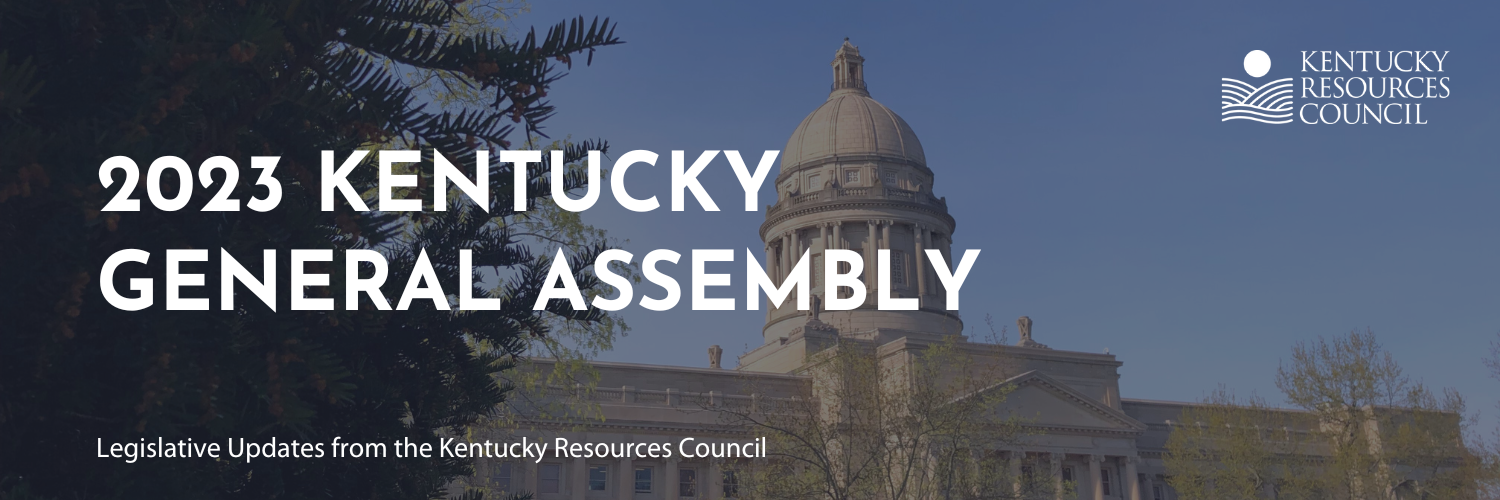2023 Testimony on SB226
« Latest News

ACTION ALERT ON SB 226
Let your legislators know you care about this bill! SB226 is an immediate and significant threat to Kentucky's environment.
Call the Legislative Message Line at 1-800-372-7181.
This bill would significantly interfere with protection of streams with federally-protected Threatened and Endangered Species by preventing Kentucky from properly applying its water quality standards when permitting discharges into streams containing these T&E species.
Also, this bill would place unworkable time limits in issuance of certifications for proposed operations under the Section 404 program (placement of dredged or fill material in waters of the US) and would alter timeframes for issuance of water quality certifications.
The bill is in several ways inconsistent with Kentucky’s obligations under the Clean Water Act and will likely spawn significant litigation and more, rather than less, delays and uncertainty in permitting under the 402 and 404 programs. KRC vigorously opposes SB 226 and encourages you to contact all State Senators with a message to “oppose SB 226 and protect Kentucky’s rivers and streams from degradation.”
Concerns Regarding SB 226
The Kentucky Resources Council, Inc. (KRC) opposes Senate Bill 226. KRC is concerned that in a number of ways, SB 226 would directly interfere with the obligations of Kentucky’s Division of Water under the Clean Water Act, and would if implemented as written, contribute to the decline of federal-protected aquatic species in Kentucky.
Among the concerns are these:
- Section 1(1)(a) creates a presumption that water quality will be maintained in Outstanding State Resource Waters with Threatened & Endangered species if applicant complies with technology-based Effluent Limitations and any species-specific conditions imposed by other agencies.
Technology-based effluent limitations are not intended to address or be fully protective of in-stream water conditions, which is why there are water quality standards that are set to assure that the conditions needed to support the designated use(s) of the receiving waters are met. Technology-based limits are indifferent to whether protected species exist in the stream or downstream, which is why they interact so that as needed, if the water quality standards are more rigorous, they will control discharge of pollutants.
The second problem is that the bill binds the Cabinet to any limits set by other agencies such as US Fish and Wildlife Service, yet those agencies do not write permits with specific numeric or other pollutant limits, but instead make findings based on specific requests as to whether an action will effect a taking of the species or harm critical habitat. Those agencies rely on the permitting agency to write permits protective of the species, and the bill , by preventing proper implementation of water quality standards, leaves a gap in the regulatory framework for species and habitat protection.
The preface reflects a tacit understanding that the bill may interfere with Kentucky’s obligations under federal law, since it directs the agency to follow the bill “to the extent allowable…under the Clean Water Act.”
All that the bill will do is to spawn litigation on implementation of the water quality standards, more challenges to individual KPDES discharge permits into waters with federal-protected species, and further degradation of T&E species health. It may also result in withdrawal of Kentucky’s delegated discharge permit program by EPA or by the courts, because issuance of a permit without consideration of and application of numeric, narrative, and antidegradation requirements and as needed imposition of WQBELs may result in loss of program delegation as well as potential federal action on the individual permits.
- The requirement to give “substantial weight” to evidence that discharges from similar operations have not caused a “material decrease” in the number of same “or similar” species of aquatic organisms, is (a) too vague to effectively implement (i.e. what is “similar” in terms of the operation and the species? What is “material?”). Additionally, the extirpation of a species is not necessarily the measure of the health of a T&E population.
- With respect to the “no more stringent” language of Section 1(1)(c), as noted above, USFWS may not specifically impose “conditions” for particular activities, but instead offers biological opinions on compliance with the ESA and expects the permitting agencies to impose conditions necessary to achieve the goals and address the concerns.
- The assumption that compliance with numeric Water Quality Standards is equivalent to compliance with narrative water quality standards, is inconsistent with the Clean Water Act, and is underprotective, since the narrative standards are a backstop for those pollutants for which a numerical standard has not been adopted, including acute and chronic toxic pollutants.
- Section 2(2) is unclear in its effect. In providing that the agency failure to conform to the time constraints for issuing a water quality certification is a “final determination” subject to administrative review under KRS 224.10-420(2), what is it that is being reviewed? KRC agrees that the remedy, which is already available, for failure to meet a timeframe (provided that timeframe allows for review and all applicable public and other agency comment) is mandamus.
- Section 3(3) impermissibly limits the scope of a water quality certification, which is requested under Section 404 to determine whether the entire project (which by definition involves placement of dredged or fill material in a water of the United States) would violate WQS, not just a Section 402 discharge.
- Finally, the imposition of unworkable timeframes for review and issuance of water quality certifications will have the unintended consequence of more denials of certification requests due to lack of adequate information on which the agency can make a determination. For each and all of these reasons, KRC opposes Senate Bill 226.
By Kentucky Resources Council
on 03/02/2023 3:54 PM
« Latest News